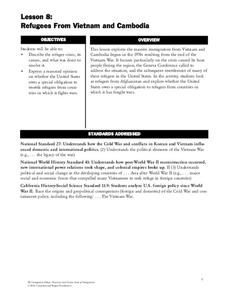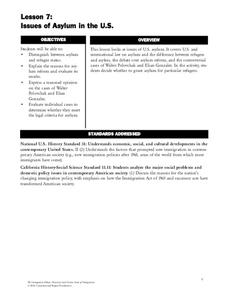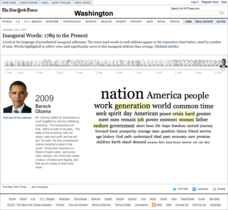Constitutional Rights Foundation
Special Order 40
The city of Los Angeles' 1979 Special Order 40 states: "LAPD officers shall not initiate police action with the objective of discovering the alien status of a person." After reading a fact sheet that details the history of Special Order...
Conneticut Department of Education
Instructional Strategies That Facilitate Learning Across Content Areas
Imagine 28 instructional strategies, appropriate for all subject areas and all grade levels. Directed Reading-Thinking Activities (DRTA), Question-Answer Relationship (QAR) activities, KWL charts, comparison matrixes, classification...
Street Law
The Challenge of Selecting an Ideal Supreme Court Nominee
Nearly every president has had the opportunity to name a nominee to the United States Supreme Court. But what makes someone an ideal candidate to become a Supreme Court justice? High schoolers test their prior knowledge about the Supreme...
Media Education Lab
The Ethics of Propaganda
What are the short and long-term consequences for consumers and producers of modern media propaganda? Class members ponder this essential question as their unit study of ethics of propaganda concludes. After examining two case studies,...
Media Education Lab
Understanding Viral Messages
Imagine advertising for a product but not being paid to do so. Welcome to the world of Viral Messaging. Class members first view a T-Mobile flash mob video that went viral and has been seen by over 14 million viewers. After analyzing the...
Media Education Lab
Propaganda in Context
"Board Game Helps Fight Real World Ebola," a video produced by Voice of America, provides the text for a guided instructional activity that asks viewers to analyze the propaganda techniques used in the video. Groups then select a example...
Constitutional Rights Foundation
Refugees from the Caribbean: Cuban and Haitian “Boat People”
Should refugees fleeing poverty be allowed the same entrance into the United States as those fleeing persecution? High schoolers read about US foreign policy in the late 20th century regarding refugees from Cuba and Haiti, and engage in...
Constitutional Rights Foundation
Plyler v. Doe: Can States Deny Public Benefits to Illegal Immigrants?
Illegal immigration is an ever-changing source of consistent controversy. A reading passage about the rights of undocumented workers and illegal immigrants—and the lack thereof—guides high schoolers into a mock trial activity. Three...
Constitutional Rights Foundation
Refugees From Vietnam and Cambodia
The United States may have pulled its troops from the Vietnam War in 1973, but the conflict was far from over for the citizens living in Asia at the time. An informative resource lets learners know about the wave of over 220,000...
Constitutional Rights Foundation
Issues of Asylum in the U.S.
Who gets to come to the United States? Examine cases of individuals seeking asylum with an informative reading passage that includes examples, statistics, and representations of public opinion regarding asylum. Groups then go on to...
Advocates for Human Rights
Nativism and Myths about Immigrants
Where do anti-immigrants myths come from, and how can they be refuted? Learners critically analyze media reports and how to identify reliable sources. After studying a timeline that details the history of US nativism, groups research the...
Advocates for Human Rights
Mock Immigration Court
As part of a unit study of immigration, class members participate in a mock Immigration Court activity in which they argue four cases before an immigration judge.
Constitutional Rights Foundation
History of Immigration Through the 1850s
Everyone living in the United States today is a descendant from an immigrant—even Native Americans. Learn about the tumultuous history of American immigration with a reading passage that discusses the ancient migration over the Bering...
NPR
Partners In Winning The War Lesson Plan
How propaganda was used to change the concept of women's roles during World War II is the focus of an online exhibit provided by the National Women's History Museum. Packed with propaganda posters and pictures, the packet points out how...
University of California
Equal Rights? The Women's Movement from Suffrage to Schlafly
If you've never heard of the Equal Rights Amendment, it's probably because there isn't one in the United States Constitution. Delve into the contentious history behind the ERA, its founders and supporters, and reasons for its political...
Scholastic
It's a Whatchamacallit
Learners formulate new applications for simple machines in an original invention that solves a common problem. They brainstorm ideas for a new product using simple machines and communicate a finished project through an oral, written, and...
Facing History and Ourselves
Civil Rights Historical Investigations
The murder of Emmett Till, the Selma to Montgomery march, and the desegregation of Boston schools are the focus of three units that ask class members to investigate why these events were so key in the struggle for civil rights. Groups...
ReadWriteThink
Living the Dream: 100 Acts of Kindness
Inspire kindness in and out of school with a lesson that challenges scholars to perform 100 acts of kindness during the time between Martin Luther King Jr. Day to Valentine's day. Leading up to a celebration of friendship, learners...
PBS
Making Change: Revolutionary Tactics of the Civil Rights Movement
The film American Revolutionary: The Evolution of Grace Lee Boggs introduces viewers to the differing philosophies of and strategies employed by 1960s civil rights leaders such as Malcolm X and Martin Luther King, Jr. and the debate over...
The New York Times
Inaugural Words: 1789 to the Present
One of the reasons presidential inaugural speeches are so inspiring is the way word choice reflects the historical context of the time. An interactive timeline invites learners to click on their president of choice and view the most...
Facing History and Ourselves
BPS Civil Rights
Include moments of heroism in a social studies module that includes three units. Focusing on the murder of Emmett Till, the movement of nonviolent resistance, and segregating schools in Boston, the units explore key events of the civil...
Facing History and Ourselves
Citizen Watchdogs and the News
To conclude their case study of media coverage of the shooting of Michael Brown by a Ferguson, Missouri, police officer, class members consider the role of citizen watchdogs in a democratic society, develop strategies for combating...
Facing History and Ourselves
Hands Up, Don't Shoot!
Why is it so difficult to develop a clear understanding of the events surrounding the shooting of Michael Brown by a Ferguson, Missouri, police officer? To answer this question class members listen to a NPR discussion of the findings of...
Facing History and Ourselves
The Importance of a Free Press
"Congress shall make no law . . . abridging the freedom of speech, or of the press;. . ." Why is this guarantee of free speech and a free press the First Amendment to the US Constitution? Why are these rights so essential to a democracy?...

























